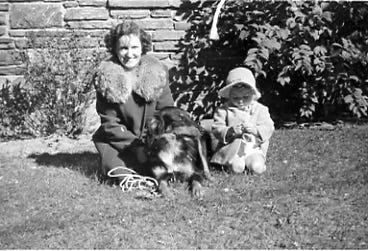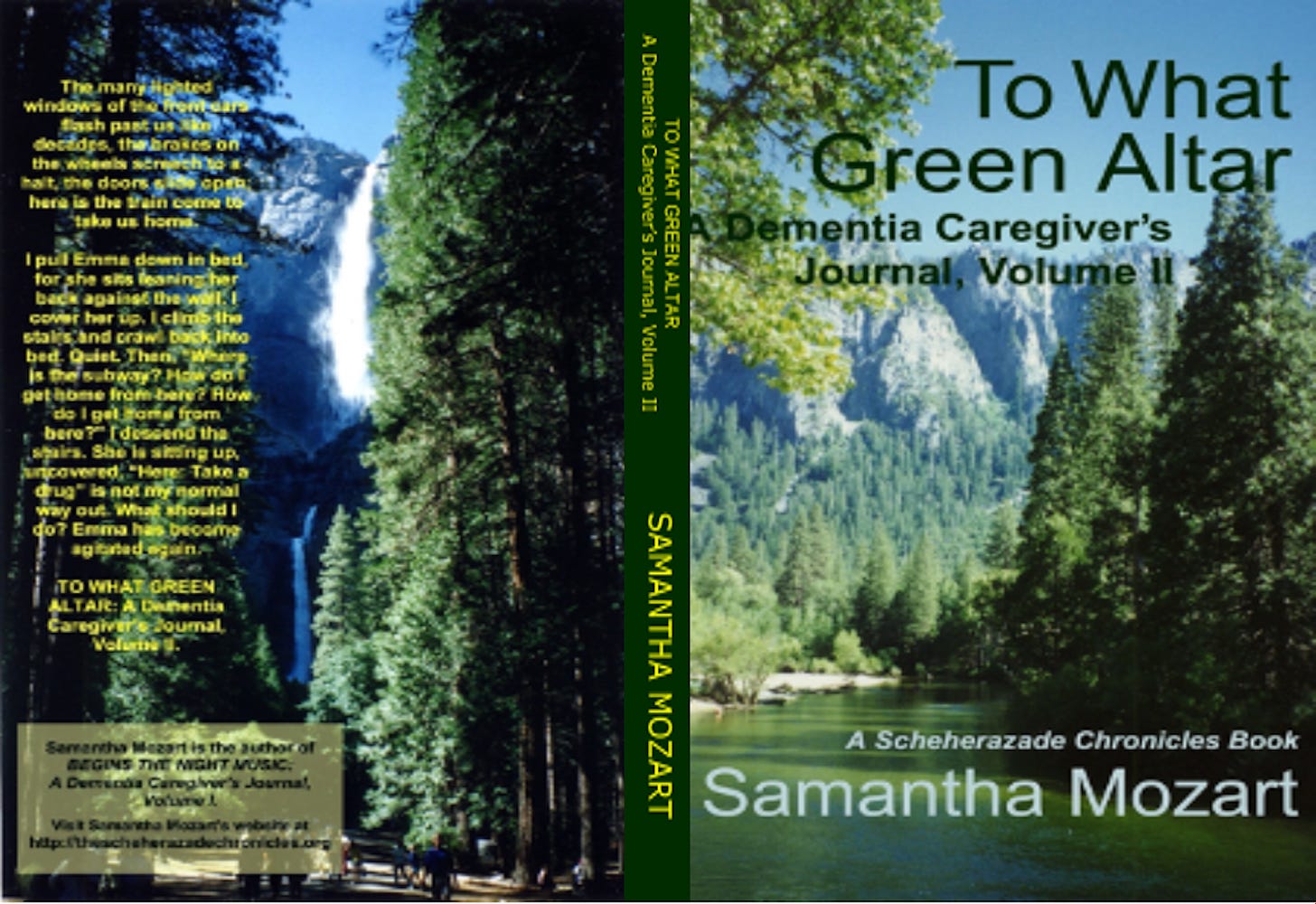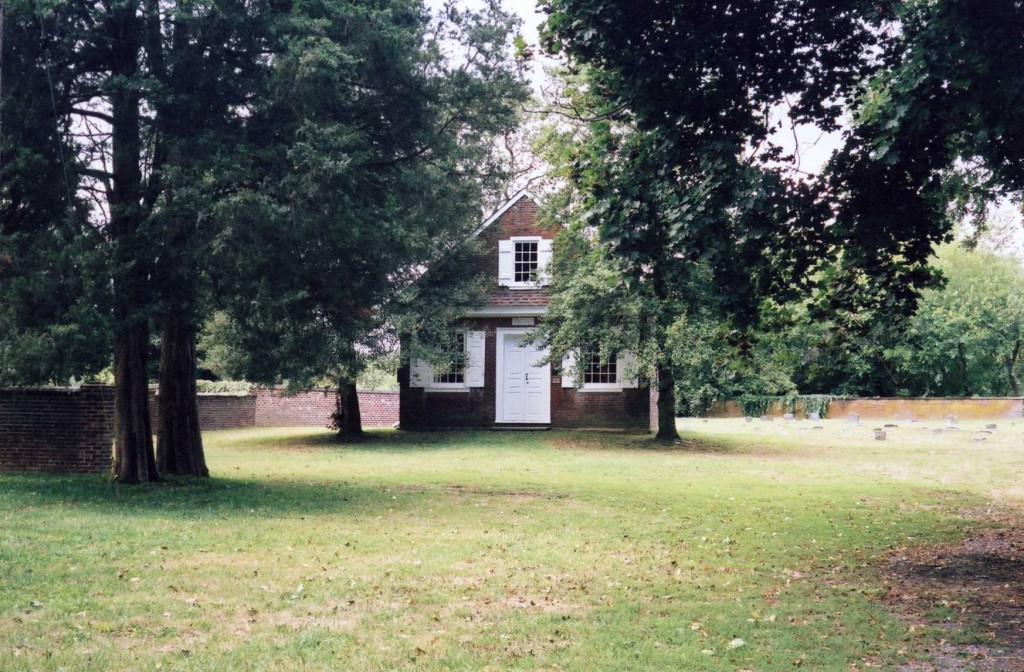This is a story I published in my book, To What Green Altar: A Dementia Caregiver’s Journal, Volume II. See the story and Amazon link to where you can buy the book.

My aunt, Butch and me.
October 6, 2011 — When I awoke this morning, down the hall bright sunlight streamed into Emma’s bedroom, splashing elongated diagonal yellow windows across her rose-colored carpet. Of course, Emma no longer sleeps in that room. She sleeps downstairs in the hospital bed in the living room, the proximity of the Victorian houses on either side of ours blocking much of the sunlight there. But, I remembered this morning how Emma loved the sunlight and how she would arise on a morning, greeting the bright sunny day, cheerful, feeling renewed. She’d greet me with a bright smile and a singing voice “Good morning, Mary Sunshine!” And then, when she had overnight guests at her house on the beach in Avalon, New Jersey, plug in the percolator and rustle up the pots, pans, egg beater and spatula, and whip up scrambled eggs, scrapple, sausage, toast, fruit and orange juice for everybody before they headed for the beach.
This morning, the sunshine was there for Emma, but she was not.
I am always amazed at how bright, cheerful and energetic Emma—and some of my odder friends—could be at the ungodly hour of nine. I have never been one of those morning people.
Maybe this is because I was born in the afternoon. Even that day, I wasn’t into getting up and out too early. I was supposed to have been born on Emma’s birthday, but I showed up two days later. I’ve been pretty much late for everything since. Better late than rushed, my philosophy.
Emma died when I was born. She forever held her doctor in the highest esteem because he brought her back. She nearly bled to death. My father, my uncle, my aunt—the whole family were there in the Fitzgerald Mercy Hospital outside Philadelphia giving blood. I came out blue with the umbilical cord wrapped around my neck. So, you could accurately describe me as a claustrophobic late person. I might point out here that Emma was late for most occasions, too. The family called her “The Late Mrs. S—.” And she’s still here, on this planet ninety-seven years, sans sea breezes and morning sunshine, but with me, Mary Sunshine.
Today would be my dog Butch’s birthday. We got him when I was two. I remember the ride home with him in the back seat of the black Packard with my grandfather. My uncle drove. My father, his brother, sat next to him in the passenger seat. Butch was a collie/shepherd mix, with black long hair, tan lower legs and a white, ruffled “shirt.” The family retold the story over those early years of this puppy sticking his paw in my grandfather’s coat pocket. Well, Granddaddy got sick when I was six and was confined to bed. I asked if it was because he hadn’t eaten his lunch. They said no, it wasn’t that. He died in October that year. I was just seven.
Granddaddy didn’t drive; until my uncle was old enough to drive, Granddaddy had a chauffeur, who, they said, polished only the side of the car when it was parked in the driveway that faced the house. Granddaddy worked at a bank and had true banker’s hours. When I was about three or four and visiting my grandparents, he’d ride the bus home from work. He’d get me up from my nap and announce that he was taking me out with him, leaving my grandmother and aunt appalled that they hadn’t had time to brush my hair. He took me for rides on buses, trolleys, trains and the passenger ferry across the Delaware River. I remember standing beside him, looking up at him, talking to him, probably asking questions, at the bus stop. When I was two and we were staying in the family Sea Isle, New Jersey, summer home, he walked me to the corner store to buy the Sunday paper. He gave me the rings from his cigar wrappers and I put them on my fingers. He took me everywhere with him. To this day, I don’t know what he died of. As much as I asked, the family always passed it off. He had a drain in his back. That’s all I remember.
In later years, my job was to walk Butch. Butch was my buddy. I took him everywhere with me. When I was eleven, I came home from school one day, looked for him, said to Emma, “Where’s Butch?” “Oh, we gave him to the SPCA,” she replied. “He was too much trouble, cleaning up his dog hairs all the time. He’ll go to a good farm.” I cried for three days.
Buy me a coffee If you like this story, please consider a small tip to help support my writing more stories, and to keep me from nodding off before I finish this one so you know how it ends.
My Nana, Emma’s mother, as I’ve told in a previous chapter, frequently took her rugs out and hung them over the clothesline in the back yard and beat them with a big club, a rug beater—it always made me think of the ace of clubs on a deck of cards. These were big, nine-by-twelve living room and dining room, gray-patterned wool rugs. She’d roll them up and somehow carry them outside. (In-between these occasions, she vacuumed them with the Hoover upright with the headlight, when she wasn’t washing her long Victorian windows inside and out, upstairs and down.) Emma would have pulled the rug out from under me a year or two after we moved into our house here, before I had saved the money to return to Southern California. She was looking into assisted living quarters. But, then, she got dementia and forgot.
It was October 1967 when I stepped out onto my patio in Redondo Beach, California, where my husband, baby daughter and I had moved in June when the United States Navy deployed him to the South China Sea, and saw the mountains across the Santa Monica Bay above Malibu for the first time. The perpetual sea mist had lifted and there they were: the Santa Monica Mountains, as if they had been mothballed and someone had set them out for the first time in months. I hadn’t known I had a view of them.
Today, so many people don’t look beyond the patio of their smart phones to see the sea mist lift. Too busy walking, heads down, texting, they never notice the cardinal in the dogwood tree laden with snow, never see the chattering squirrel running along the wire, never hear the robins chirp to one another on a summer evening, never see me sitting on my green and white front porch behind the walnut tree the squirrels planted in my flower bed there, watching them. They lead gray, superficial lives filled with pages of ticked off boxes on a form; their days covered in a layer of high, thin clouds through which the sun struggles to shine in a hazy glare.
Butch would be sixty-eight today, old even in non-dog years. E. M. Forster, notably in two of his novels, A Passage to India and Where Angels Fear to Tread, gets his characters into a crisis; they debate which way to turn to resolve their dilemma. Then a wise one says, “What does it matter which you do? The outcome will be the same.” That outcome is not one the reader—nor characters living real lives—might expect. The point is not to get so stressed about it, to just flow with the events in your life. I think should I heed this advice, I would learn patience. My friend, a spiritual teacher, who just married the love of his life, said to me today, not particularly speaking of his own situation, that regarding the one you are in love with … “what’s age got to do with it?” Oh. True. His supportive comment and incisive truth extracts a huge obstacle to a union.
My dilemma is this, though: Once this hospice thing is over, this team of aide, nurse, social worker, music therapist, chaplain, volunteers and doctor will no longer have contact with me; the circle of light closes and they just fade out. The title reads, “The End.” I’ve told them I don’t want to never see them again; I have made friends with them, as I have with many of my business associates over the years. It seems natural: if you really like someone and you share common interests, oneness of mind, that you’d want to become friends. So, when I lose Emma, I lose everything and everyone. I am trying to give myself a spiritual upgrade here, about this. How can I watch them walk away and, myself, go with the flow? Somehow, this potential situation, to me, flies in the face of the human condition.
Our planet rolls from the golden sun of morning to the bronze light and long shadows of late afternoon, and as it continues its turning, pulls out the rug of the earth from under the sun, and then it is night, dark, pitch black; and out of those dark energies, slowly appears the moon. “Go to it,” a voice says from somewhere over my shoulder. And I go to enter within the embrace of its tender, silver and blue arms. In that place is a time for reflection. Maybe this is a mystical experience. As the sun sets, the sun also rises.
~Samantha Mozart
As it turns out, I have remained friends with our hospice nurse and social worker/bereavement counselor. The three of us go to lunch together and we laugh and laugh as we always have. And I still live in my wonderful Victorian home, although the green and white porch paint is peeling.
I invite you to visit and subscribe to my Scheherazade Chronicles publication at https://samanthamozart.substack.com.







 There are no windows along the pent eaves on the sides of the building. Local Quakers, some at the expense of getting caught and losing their own property, hid runaway slaves in a small alcove under the eaves, pictured here. Prominent among them was conductor Thomas Garrett, born in 1789 on his family’s farm, Thornfield, west of Philadelphia. The Garrett family held abolitionist beliefs. When Thomas was a boy, a family paid servant was abducted by men intent on selling her as a slave in the South. The men were tracked down and she was returned. Thomas never forgot the incident, though, and it served to intensify his abolitionist beliefs. Coincidentally, I grew up in Drexel Hill, Pa., on land that was once Thornfield. The Garrett home still stands and is open for tours.
There are no windows along the pent eaves on the sides of the building. Local Quakers, some at the expense of getting caught and losing their own property, hid runaway slaves in a small alcove under the eaves, pictured here. Prominent among them was conductor Thomas Garrett, born in 1789 on his family’s farm, Thornfield, west of Philadelphia. The Garrett family held abolitionist beliefs. When Thomas was a boy, a family paid servant was abducted by men intent on selling her as a slave in the South. The men were tracked down and she was returned. Thomas never forgot the incident, though, and it served to intensify his abolitionist beliefs. Coincidentally, I grew up in Drexel Hill, Pa., on land that was once Thornfield. The Garrett home still stands and is open for tours.



